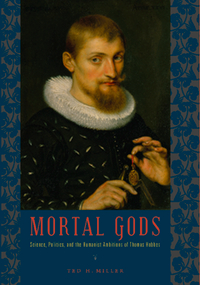The last decade was clearly something of a Hobbesian moment in American history. Now, political philosopher and Hobbes scholar Ted H. Miller has written a book entitled Mortal Gods: Science, Politics, and the Humanist Ambitions of Thomas Hobbes, in which he examines the English philosopher’s work and its relationship to court politics, absolutist rule, and the seventeenth-century fascination with practical mathematics. I put six questions to Miller about his new book:
1. If the political philosophy of Thomas Hobbes can be separated from that of John Locke on a single practical point, it is probably the notion of accountability of senior political figures. Locke teaches us that no man can be above the law. But for Hobbes, as you note, the sovereign is personified as a law-giver who operates outside the limitations of law. Many in America today believe we are witnessing a resurgence of notions of immunity and unaccountability that benefit the powerful and the wealthy. Is this the legacy of Thomas Hobbes?

It’s a very troubling resurgence. As a proponent of absolutist sovereignty, Hobbes plays a part, but he isn’t alone. Moreover, he might aid more than one perspective on this question. Like absolutists before and after, he taught that sovereign powers ought not to be held to law by their subjects. For some, including Locke, Hobbes’s sovereign is an untamed beast who roams his domain, a threat to subjects rather than a legitimate authority. For Hobbes himself, an unquestionable sovereign is the very condition of an ordered and lawful state. With no last word on the law, chaos results. A sovereign held accountable within the state could not do what a sovereign must: “overawe” subjects and hold them accountable. This unusual status of his sovereign as the exempt keeper of law made Hobbes a kind of beacon to critics of rule-of-law liberals in the twentieth century. They noted that Hobbes’s sovereign might suspend, or destroy and reconstitute, basic law in crisis moments.
Hobbes, however, might offer his own solution to the problem of wealthy and powerful people who stand immune and unaccountable: if they claim this immunity without sovereign warrant, then sovereign powers should exercise their force to hold them to account. Unfortunately, much of the immunity you’ve referenced gets the nod from those who claim sovereign power. Some have described the vast increases in executive power after 9/11 as a form of neo-absolutism. The creeping immunity granted those who do the state’s bidding can be seen in the same light.
2. You write that Hobbes’s work reflects the “problems we face today” in the realms of reason and politics, and that he is a “negative example” for us. What do you mean by this?
Nature (and nature’s architect) had fallen short. With the right science, human beings could become the ordering power over nature. In Hobbes’s philosophy the being that had been taught to perfect himself had not give up the habit of seeking god-like perfections; he had simply lost his humility.
—From Mortal Gods: Science, Politics, and the Humanist Ambitions of Thomas Hobbes.
Reprinted by permission of Pennsylvania State University Press, © 2011 Ted H. Miller.
Aside from what we’ve just discussed, these problems are concerns for political theorists and the social sciences generally. Can we avoid forcing what we study into predetermined categories? Is there an inevitable kind of violence done here—think, for example, of the way phenomena are made to fit Kuhnian paradigms. These and some related possibilities have haunted many political theorists, and we’ve done our best to trouble others in the social sciences with these concerns. We’ve tended to assume, however, that it is enough to show others the violence they do. “If they only knew!” Critically examining one’s own, and others’, foundational premises has been an ongoing, and often worthy, project, but it reveals its own blind spot. This is where Hobbes can be a useful negative exemplar. He knew, in his own way, that reason does this now-scandalous work. More than that, he pursued the coercive and violent reshaping of his world. Some say Hobbes misunderstood human nature, or politics, or that he hit the nail on the head. I think this can actually cloud our own understanding of his enterprise. I join a line of interpretation that insists Hobbes sought to remake, not merely report upon, the world.
3. You build your book around Hobbes’s immodest claim that man can become a “mortal god,” and you suggest that he was probably an atheist. What does the notion of “mortal god” mean for Hobbes’s perspectives on politics and mathematics?
Here I depart somewhat from the line of interpretation I’ve just mentioned. Most still hold the view that Hobbes chose mathematics as a tool for grasping the world, for knowing it as it truly is, or through the lens of rational re-description. Re-making and describing (even rationally) are in tension with one another. Hobbes chose the former over the latter, and he could be indifferent to many of the goals of scientific description retrospectively assigned him today. Why? Amplifying his absolutism, he called the commonwealth’s sovereign a “mortal god,” but this form of immodest ambition permeated his science.
We’ve always assumed that when Hobbes picked up mathematics, he dropped his humanism (at least for a period). It’s a bad assumption. Humanists had real affinities for mathematics, for what it could do for those students who possessed its skills, and for the fruits of mathematically informed practices such as architecture, painting, and map-making. Hobbes’s affinities for mathematics grew out of, not in opposition to, this part of humanist culture. Most importantly, he and these humanists associated mathematics with maker’s knowledge. We know best what we make ourselves; this knowledge supersedes our capacity to know something already made by another, notably God. But who needs to know how God made our often miserable world when we can make things, perhaps better, for ourselves? We know the geometrical figures on the page with utmost certainty because we make them, and Hobbes thought this applied to more ambitious things, like the well-ordered state he sought to create. His science was radically creative. A god who can will a world into existence requires no scientific report on its operations. Mathematics made it possible for men to be most god-like in their creative, not descriptive, power. Hobbes extends the humanist pursuit of practical virtue to its limit: humans might rival God as creators. He may have been an atheist, but the idea of creating by superior intelligence and power was very much a living faith for Hobbes. He was, however, anxious to stress to his adversaries that no one could use science to determine how an omnipotent God operated in the universe. He never relinquished this weapon against natural philosophers.
4. Hobbes’s political theories seem remarkably attuned to the interests of his patrons and opposed to the politics of his academic rivals at Oxford. Is it fair to say that he was an opportunist?
Hobbes’s response to political and intellectual chaos was to build an order by his own means, and to his critics this looked very much like inviting kings to play at being God. Such critics had a better idea of Hobbes’s ambitions than many of his admirers or critics today.
—From Mortal Gods: Science, Politics, and the Humanist Ambitions of Thomas Hobbes.
Reprinted by permission of Pennsylvania State University Press, © 2011 Ted H. Miller.
It might not be fair for us to call Hobbes an opportunist. Liberalism leads us to look down upon those who seek favor through patrons. We prefer to think that winners are deserving when chosen in a free competition of equals. Some credit (or blame) Hobbes for fostering this way of thought, but he made his way in a world of patronage, where they saw these things differently. He was skilled in these affairs, but I’m inclined to think that his patrons chose him because they found him a thinker already fit for their prior enthusiasm for practical mathematics. I’d be reluctant to accuse him of an opportunist’s insincerity.
Among his royalist critics, however, Hobbes was indeed an “opportunist,” or something worse. He argued that a sovereign who could no longer offer a subject protection was no longer owed obedience. It wasn’t having patrons, but betraying them, that raised their hackles. On the other hand, Hobbes was infuriated with patronage arrangements after the restoration. Not unlike others who had stood with the Stuarts—as he did until things became untenable for him in the exiled court in Paris—he wished to see the fortunes of some reversed. Those who were considerably less loyal, indeed allied with the crown’s enemies, had gained and kept high positions at Oxford. John Wallis, who also attacked Hobbes’s mathematics, and had been advanced further with the restoration settlement, was a particular target.
5. You say that Hobbes wrote the Leviathan as a gift, expecting to receive something in return. For whom did he write it, and what was he expecting?

Critics said he actually wrote it for Cromwell. Hobbes denied this, and I believe him. Leviathan was composed while he was tutoring prince Charles (later Charles II, the restored Stuart monarch) in mathematics. Most importantly, however, Leviathan was written for a would-be sovereign. It was, I think, a kind of mathematical mirror for a prince, one that echoed another mirror-for-princes genre at the time, the court masque. Both incorporated ostentatious displays of mathematical learning, and showed the prince an image of himself as a god-like bringer of order.
I think Hobbes made clear what he wanted in return. He wanted his doctrines taught in the schools, by sovereign command. He promised that the doctrine would produce obedient subjects, and in return he would have achieved the approval (and perhaps some delegated authority) of an absolutist sovereign of his own design. This never happened. His enemies at court read the work and had him refused. He then quickly fled the court, this in 1651. He returned to the king’s good graces with the restoration, but he never received the reward he sought.
6. Hobbes’s polemics frequently concerned his vision of the university and what it should be. How did his views compare with our contemporary notion of the university as a forum for free thought and free discourse?
Those were not his ideals, even as he helped unshackle minds from existing religious authority. The universities were first an instrument for the sovereign—a place for generating obedient and useful subjects, not places of unfettered inquiry. What was taught and who would teach it were the sovereign’s prerogative. Teaching sedition would not have been tolerated. Hobbes gives us plenty of food for thought, and he has a place in the universities today. It’s not the place he sought, but, all in all, I think he ultimately got his just deserts.


